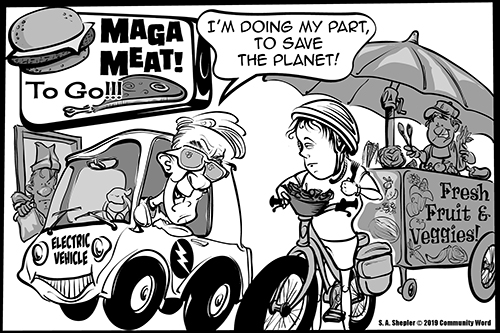
The most effective way to slow global climate change is with dietary changes, according to Dr. John McDougall. Changes in our diet can be more effective immediately than driving a Prius, turning off the lights, lowering the thermostat and viable acceleration of the conversion to renewable fuels.
As a physician who began his practice in 1968, McDougall initially advocated for a vegan diet to help his patients. It was all about the health of his patients. Over the years, he began to learn more about the correlation between a plant-based diet and environmental health. The mounting evidence linking livestock production to global climate change convinced McDougall we are “eating the planet to death.”
At a seminar a number of years ago, McDougall hosted Robert Goodland, Ph.D., and former ecologist with the World Bank.
Goodland and his colleague Jeff Anhang had recalculated an estimate that 18% of greenhouse gases are due to livestock production. The recalculation, published in Worldwatch journal, found the true number is more than 51%, and Goodland said that is a conservative estimate.
He had convinced the World Bank to stop making loans to tobacco producers. He lobbied the organization to stop providing capital for large-scale livestock production, especially in the Amazon where the rain forest is being destroyed to expand land for grazing cattle.
Misconceptions about animal consumption are widespread, Goodland said, noting it is totally false that humans must consume at least some animal protein.
That misconception is pervasive and false, he said.
“Modest change in diet is the only way to prevent climate catastrophe,” Goodland said, noting that the conventional way to slow climate change is to reduce oil, gas and fossil fuel use and convert to renewables like solar, wind and tidal sources of energy.
“But that will take a long time and requires political will,” he said. “The only way to prevent catastrophic global climate change is food and agriculture.”
However, while animal consumption has plateaued in the United States, it is on the rise in other countries, he said, noting that China is now the “diabetes capital” of the world due to massive increases in animal consumption.
In 1945, there were an estimated 9 billion land-based livestock animals. That has increased to more than 70 billion today.
Even more alarming is that the UN Food and Agriculture Organization predicted that livestock production will have to double by 2050 in order to feed the world’s population that is expected to reach 9 billion people – a prediction and proposed remedy based on dangerously erroneous assumptions, Goodland said.
Among his findings:
- A vegan diet costs less than a meat-based diet even before the medical cost savings are factored in such as reductions in rates of diabetes, heart disease and cancer.
- With half of the world’s land devoted to livestock, converting to a plant-based diet can have a huge impact on the environment.
Goodland and his colleague were “vilified” when they released their calculation of 51%. He pointed at the U.S. government, influenced heavily by the livestock industry, as promoting global consumption of U.S. meat by subsidizing meat exports.
When other countries announced they were restricting U.S. meat imports because of GMOs and other factors, the U.S. government responded by threatening to penalize those countries with trade sanctions.
McDougall suggests a starch-based diet for saving the planet from global climate change. He said science supports a diet based on tubers and other starches. He is frustrated that medical schools still devote little time to the correlation between a vegan diet and health.
More than changing your diet to save your own health, McDougall and Goodland advocate moving toward a vegan diet to save the world for our grandchildren.
It is the only fast change that doesn’t require political backbone. If people change the way they eat, industry will follow consumers.
Robert Goodland died in 2013, but his research and his message are increasingly relevant today.
